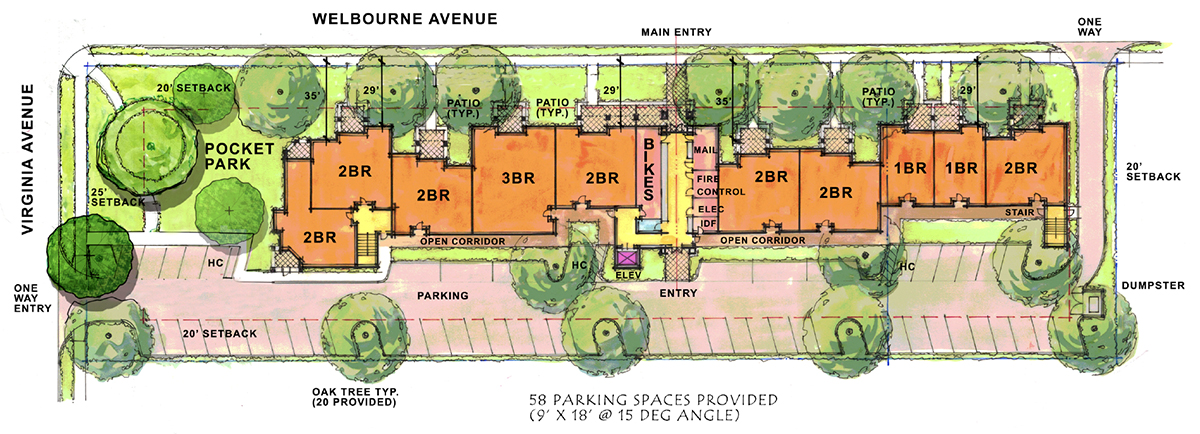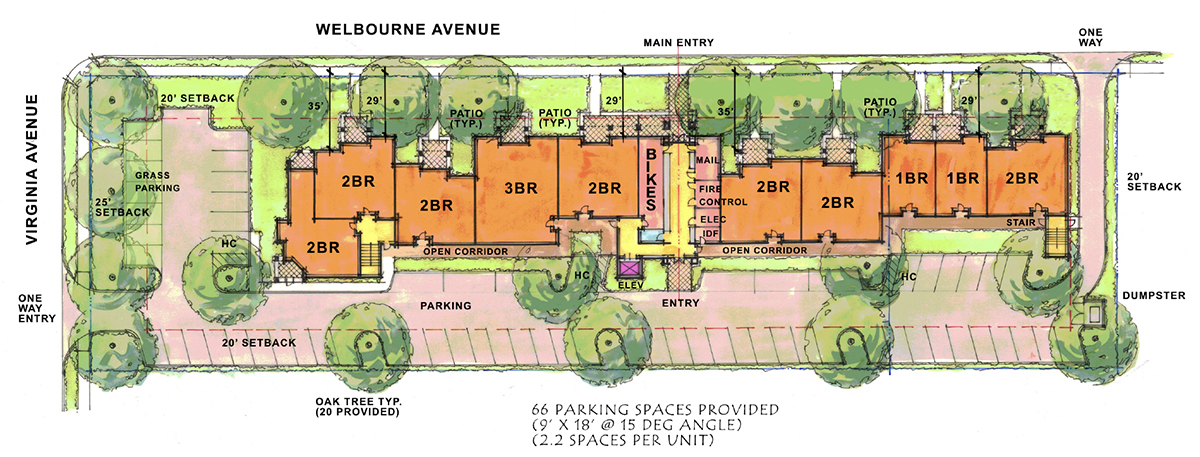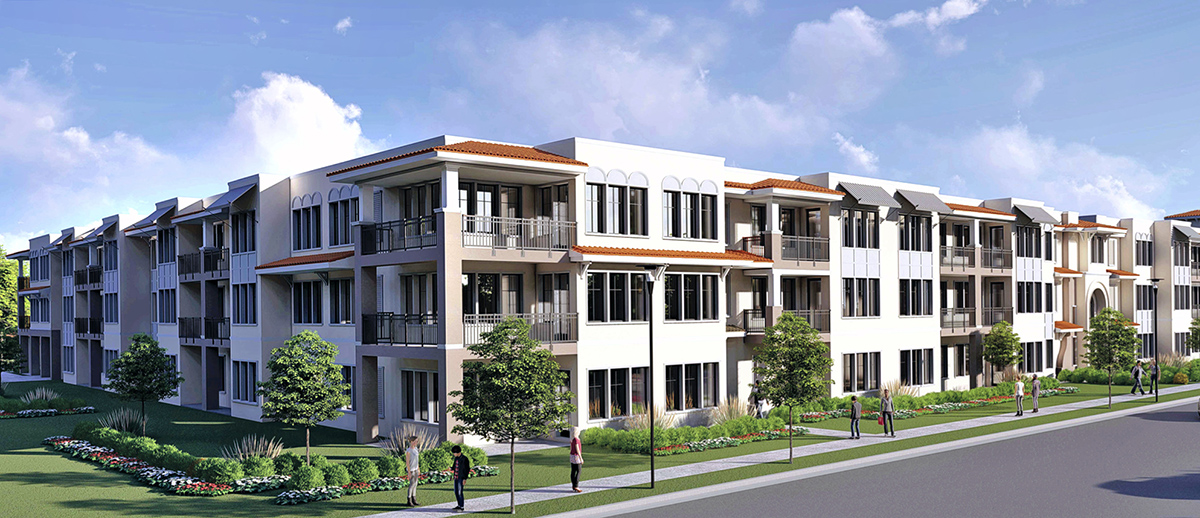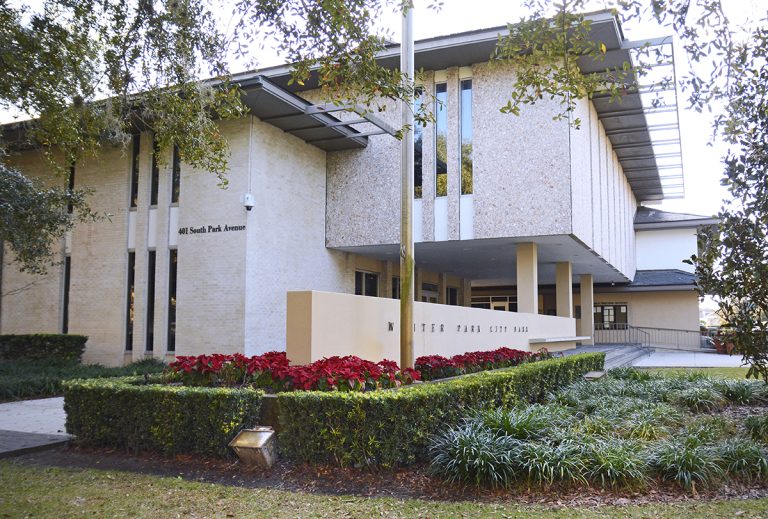After months of controversy and design revisions, questions over a community benefit agreement and ad valorem tax status led Planning & Zoning Board members to table a June 11 hearing on a new conditional use request for the Rollins College faculty and staff apartment project.
The first design called for a three-story, 80,981-square-foot, 48-unit apartment building on Rollins-owned properties along W. New England, W. Welbourne, and S. Virginia avenues. But pushback from residents and City Commission over density and exterior design led to a downsized, 72,933 square-foot, 39-unit plan that the College voluntarily withdrew for additional revisions. A new 30-unit, three-story building measuring 50,671 square feet was to be presented at the May 7 Planning & Zoning Board meeting until a delay in posting the public hearing notice caused the hearing to be pushed to June 11, when new 45,842-square-foot design by architect Robert Schaeffer and pro bono developer Alan Ginsburg was presented.


In addition to providing a stormwater retention system beneath the property and the option for a greenspace or additional parking at the west end, the latest revision addresses a Comprehensive Plan policy that limits maximum building height along Welbourne Avenue to 2.5 stories. A new section at the northwest corner complies with the code by reducing the height from three stories to two while a three-story portion, set back nine feet beyond the front setback, decreases massing at street-level views.


The new proposal also continues a previous request for a variance to the 17 units-per-acre allowed by the property’s R3 zoning. Based on a “non-conforming use” allowance for 14 existing residential units at the east end of the property, the allowance can be extended to a redevelopment if it is deemed a community benefit. While conditional approval is based on Rollins’ consent to meet a list of city requests – including a 5-foot easement along West Welbourne Avenue for city-installed parking, the prohibition of student housing and onsite classrooms, a six month minimum on all apartment unit leases, and the payment of all ad valorem taxes unless otherwise permitted by the state – P&Z Board members took issue with the omission of a previous community benefit agreement whereby the building remains workforce housing for faculty and student-facing staff for a period of 30-years.
Ginsburg, who was also instrumental in the development of the Rollins bid to redevelop the old library building into the new Rollins Museum of Art, stated Rollins’ intent to follow through with the 30-year agreement. Rollins’ attorney Becky Wilson admitted the agreement was not included since its importance was not conveyed in community conversations that took place during the redesign. “It seemed to us what was more important to the community was the aesthetics of the architecture,” she said. “But if it’s important to this board and it’s important to Commission we’re certainly happy to put that back on the table.”
Despite the concessions, concerns regarding taxable status remained. Board member Bill Segal requested that, in the event ad valorem tax exemption is permitted under state statutes, the College should agree to pay a portion of the property taxes for police and fire service. “Everyone else has to pay for it and to me that’s just a basic obligation they should take on voluntarily.”
Board Vice Chair Warren Lindsey agreed with Segal’s comments and suggested Rollins submit a written community benefit agreement outlining a pilot program for the requested ad valorem payments and the 30-year building use agreement. He also requested a neighborhood meeting be held to present the new designs to the community and solicit additional feedback. “I think we have a responsibility as a board not to send (the proposal) in an incomplete fashion to the City Commission,” he said.
A motion made by Lindsey to table consideration of the application until Rollins can meet the added guidelines was seconded by Jim Fitch and passed by a 4-3 vote. Board members Alex Stringfellow and Michael Spencer and Board Chair David Bornstein dissented and stated their willingness to move forward with the project as presented. “What is the community benefit here? In my mind, it is that Rollins is attempting to provide housing for people who could not otherwise afford to live here,” Bornstein said.
Wilson advised Board members that the tax payment request can be a condition of approval in their recommendation to City Commission, but that it would not be addressed before the next meeting.
The application will be considered at the next Planning & Zoning Board meeting on July 2. The proposal would then be brought before City Commission for its consideration at a future meeting. For information, virtual access, and to download a copy of the meeting agenda, log onto cityofwinterpark.org/meetings.



